To allow as many TU/e students as possible to go, student party Groep-één had arranged a touring bus. Around forty students boarded it outside the Atlas building, leaving just a few empty seats. During the ride, party music was played on a small loudspeaker in the back of the bus. At the front, there was talk about student life, parties from the night before, and of course the expectations of the protest. How busy it would be, whether it would stay dry and who would present.
The bus dropped the students off very close to the Malieveld. On the field next to it, the Koekamp, a few hundred students from all over the country gathered. They held up signs likening studying to good wine (it just needs time) or using simpler terms – sometimes accompanied by an expletive or two – to deliver their message.
Glum
Data Science student Merel Jung (21) has joined to defend both her own interests and those of fellow students. “For years, students have been able to develop at their own pace, but now the cabinet office wants to take this away from us. On top of that, the government made it harder to survive by lowering the basic grant and it’s planning to implement cutbacks, while they should actually be solving the shortages on the labor market.”
Jung is in the second year of her studies, but she has a chronic disease as well as a disability. “I know my limitations and it’s unlikely that I’ll complete my studies within the next two years. And the prospect of being penalized for that is quite a glum one.” Jung, therefore, would like to see the cabinet office be more considerate of students. “We’re doing our best and want to change the world, but this will take some of us a bit longer than others.”
Speakers
One by one, various speakers take the stage. They all have the same message: down with the planned slow-progress penalty and the cutbacks in education and research.
“There’s only one word for the plans of this cabinet office: disgraceful,” says Abdelkader Karbache, chair of the Dutch Student Union. “It puts us students at a huge disadvantage, even if the slow-progress penalty is withdrawn.” Although he also conveys a critical note to the crowd. “We, students, have also kind of allowed this to happen. We accepted that money was taken from us and we work for minimum wage. I hope that one day, we’ll be able to say: the bad-luck generation was followed by a generation that stood up for itself.”
Simple breach of contract
President of trade union confederation FNV Tuur Elzinga also said a few words. In the morning, he had negotiated about the early retirement for tough professions, and successfully so. “The decrease of the basic grant isn’t consistent with the rising cost of living. The right to studying and receiving education is being eroded even further, but it pays to protest. That’s what I wanted to tell you today.”
The final speaker was Marijtje Jongsma of the General Education Union. Out of all the speakers, she expressed the fiercest criticism of the cabinet office’s planned cutbacks. “They’re dismantling education in the worst possible way. If students are to solve the major social problems of our time, inclusive and accessible education are of the essence. The government is simply committing breach of contract, taking an axe to our future instead of investing in it as they should, because you are the ones that will shape the future.”
De groete met je boete
After the speakers are done, it’s time for a march through the center of The Hague. While they’re walking, the students shout all kinds of slogans, like De groete, de groete, de groete met je boete (Say bye, bye, bye to your penalty) and Vecht vecht vecht, onderwijs is een recht. (Fight fight fight, education is a right).
There are mounted police officers and fences along the route to keep the crowd under control. The long procession attracts a lot of attention. Many people are filming, others laugh and express their support, and some swear because of the nuisance. Now and then, the protest seems to lose its focus, for example when the war in Gaza is referenced or anti-capitalist slogans are shouted through megaphones.
Harder
Gene Sanchez (23), Applied Physics master’s student, joined the protest because of the slow-progress penalty and the cutbacks. “In our program, everyone takes four years or more to finish. So if you’re penalized after your fifth year, it’s likely fewer people will chose this program, despite the huge shortages in the labor market.”
Jules van Gisteren (22), who’s enrolled in the bachelor’s program of Applied Physics, adds that the slow-progress penalty obstructs students’ self-development. “It simply leaves no room for doing something next to your studies.”
Conclusion
At the end of the route, there were some delays. Riot police vans blocked the road to the Koekamp, where the protest march was actually supposed to end, but the police wanted them to go to another field. After a few minutes, the group was allowed to continue after all. The protest was concluded with a petition against the CDA and ChristenUnie parties, whose senators recently voted against the cancellation of the slow-progress penalty, even though they had originally been in favor of cancelling it.
On the way back, a considerably higher number of seats are empty than on the way there. More than half of the students stopped for lunch during the march or went somewhere to eat straight after the protest, taking the train home instead.
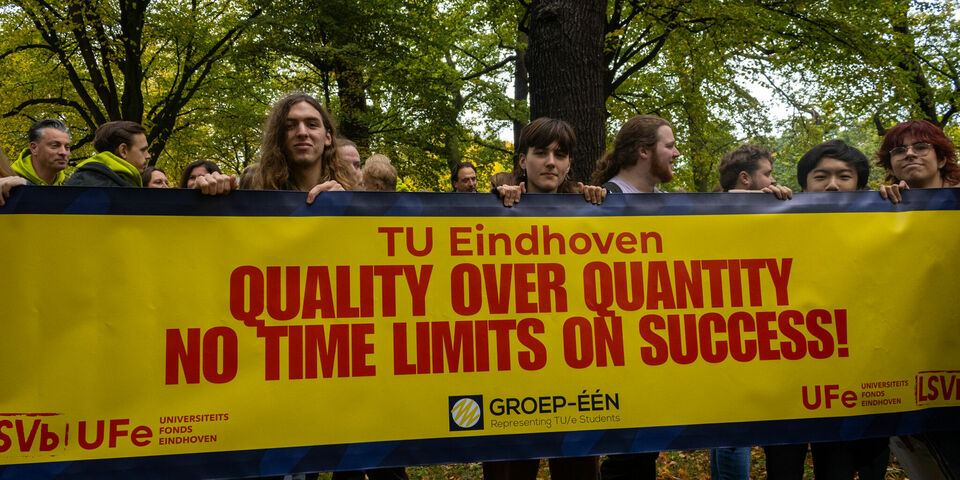

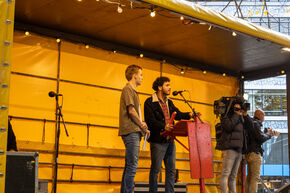
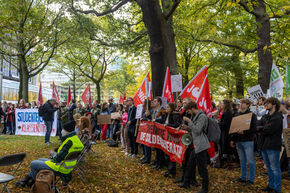
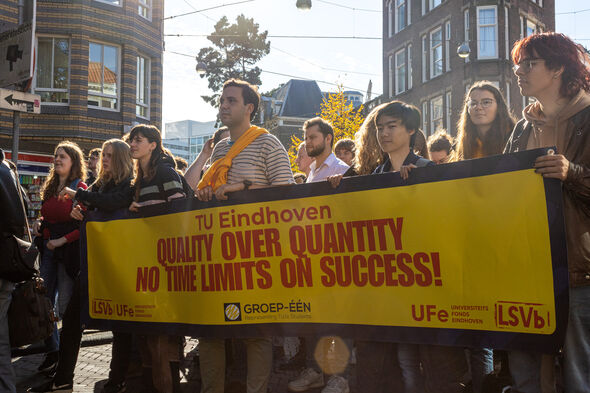
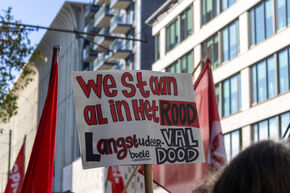
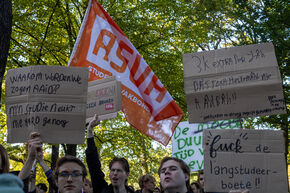
Discussion